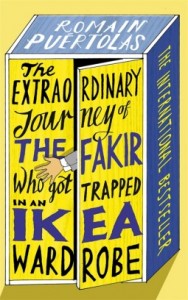 Title: Lullaby (Goodreads)
Title: Lullaby (Goodreads)
Author: Leïla Slimani
Translator: Sam Taylor
Published: Faber & Faber, 2016
Pages: 224
Genres: Contemporary
My Copy: Paperback
Buy: Amazon, Book Depository, Kindle, Wordery (or visit your local Indie bookstore)
At the beginning of the year Lullaby by Leïla Slimani (The Perfect Nanny in North America) was getting a lot of attention. It tells the story of Myriam, a French-Moroccan lawyer who is anxious to get back to work after giving birth to her second child. Before doing so, they must find the perfect nanny to take care of their children. Louise is a polite and quiet woman who goes above and beyond looking after the two children but is she really the perfect nanny?
Leïla Slimani is a French-Moroccan journalist who lives in Paris with her two young children. My interpretation of this novel is that Leïla Slimani let all her insecurities about leaving her children with a nanny play out on the page. There is a constant feeling of fear and jealousy that it explored inside Myriam’s mind. It is this realism that makes Lullaby a novel worth reading.
Lullaby won the Prix Goncourt in 2016 which is one of France’s most prestigious literary awards. Winners of this prize include Marcel Proust for In Search of Lost Time, Simone de Beauvoir (The Mandarins), and Marguerite Duras with her amazing novel The Lover. With this type of prestige behind the prize, it is not surprising that Leïla Slimani’s Chanson douce was translated so quickly.
The baby is dead. It only took a few seconds.
This is a dark glimpse into the mind of motherhood, something I would pair with Die, My Love. It must have been very therapeutic for Leïla Slimani to write out this novel and explore the feeling of returning to the work force. I do not know if this is autobiographical in any way, I just base my assumption on the similarities of Myriam and Leïla. I understand why North America called this novel The Perfect Nanny but honestly the French title Chanson douce translates to soft song. Sam Taylor is the translator for both, I am just a little wary about the accuracy of the text when the title is vastly different from the original. Lullaby is a quick and thrilling read that will make you feel uncomfortable. This is not for everyone but for fans of dark fiction, it is worth checking out.

 Title: The 7th Function of Language (
Title: The 7th Function of Language ( Title: A Meal in Winter (
Title: A Meal in Winter ( Title: The Extraordinary Journey of the Fakir Who Got Trapped in an Ikea Wardrobe (
Title: The Extraordinary Journey of the Fakir Who Got Trapped in an Ikea Wardrobe (